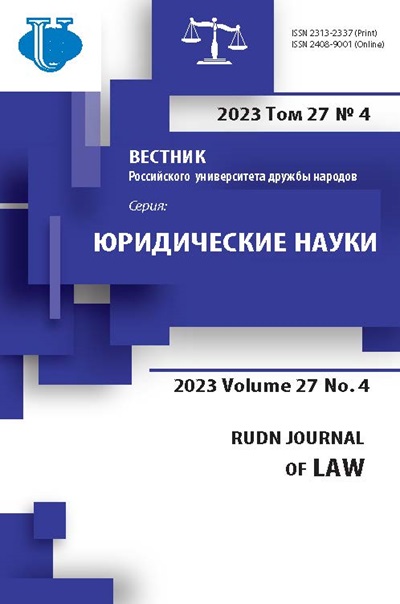The legal status of the class members during the group litigation
- Authors: Trezubov E.S.1, Zvyagina N.S.1
-
Affiliations:
- Kemerovo State University
- Issue: Vol 27, No 4 (2023)
- Pages: 1065-1078
- Section: JUSTICE IN RUSSIA AND FOREIGN COUNTRIES
- URL: https://journals.rudn.ru/law/article/view/36903
- DOI: https://doi.org/10.22363/2313-2337-2023-27-4-1065-1078
- EDN: https://elibrary.ru/NIQHXP
- ID: 36903
Cite item
Abstract
The study discusses certain rules of group litigation in the civil procedure in the context of the legal status of class members in procedural relations. Attention is paid to the rights and obligations of the person who applies to court with a request to protect the rights and legitimate interests of a group of members. Participants in a class action include the person conducting the case (plaintiff-representative) and group members who joined the collective claim. The comparative legal method and teleological interpretation allow to conclude that there are active procedural relations only between the court and the claimant-representative, which predetermines the possibility of performing administrative actions, proving and appealing judicial acts only by the plaintiff, but not by the other claimants. The extremely curtailed scope of powers of the group members is justified by their voluntary joining a class action lawsuit. Relations within a group of persons are substantive in nature; this allows to highlight the necessity of appropriate private material mechanisms to satisfy the interests of the majority of participants under the rules on decisions in meetings. In view of the possibility of consolidating in a class homogeneous but different in size substantive claims of the group members we believe it is essential to establish the majority criterion, regardless of the price of the claim of each member. The research also reveals the contradiction in legal regulation in the event of a refusal to certify a group of persons after the initiation of proceedings on a class action in civil, arbitration and administrative litigation, substantiates the inexpediency of leaving a class action without consideration, and the need to consider personal claims of group members and allocate relevant cases in a separate production, as provided for in the Arbitration (Commercial) Procedure Code of the Russian Federation. Attention is drawn to the gaps in the legal regulation of group proceedings in terms of establishing the amount and procedure for paying the state fee.
About the authors
Egor S. Trezubov
Kemerovo State University
Author for correspondence.
Email: egortrezubov@mail.ru
ORCID iD: 0000-0003-2607-0405
SPIN-code: 3027-3186
ResearcherId: N-9078-2017
Candidate of Legal Sciences, Associate professor of the Department of Labor and Environmental Law and Civil Procedure
6 Krasnaya str., Kemerovo, 650000, Russian FederationNatalya S. Zvyagina
Kemerovo State University
Email: natalia.sheglova@list.ru
SPIN-code: 4707-1477
senior lecturer of the Department of Labor and Environmental Law and Civil Procedure 6 Krasnaya str., Kemerovo, 650000, Russian Federation
References
- Aiken, A.W. (2017) Class action notice in the digital age. University of Pennsylvania Law Review. (165), 967-1018.
- Alieskerov, M.A. (2022) Class Action in Adversarial Civil Procedure: Procedural Limits and Restrictions. Herald of Civil Procedure. 12(6), 133-151. https://doi.org/10.24031/2226-0781-2022-12-6-133-151 (in Russian).
- Andrews, N. (2012) The system of civil procedure in England: litigation, mediation and arbitration. Translation from English. Khodykin, R.M. (ed.). University of Cambridge. M.: Infotropic Media Publ. (in Russian).
- Borisova, A.V. & Kotelnikova, E.A. (2020) Novelties of the Class Action Institution in Russian Civil Proceedings. Arbitragniy I grazhdanskiy process - Commercial and Civil Procedure. (4), 16-19. https://doi.org/10.18572/1812-383X-2020-4-16-19 (in Russian).
- Burbank, S.B. & Wolf, T.B. (2018) Class actions, statutes of limitations and repose, and federal common law. University of Pennsylvania Law Review. 167(1), 1-70.
- Domshenko, V.G. (2022) Competence and Jurisdiction of Class Actions in Arbitration and Civil Procedure: Discussion Issues. Vestnik grazhdanskogo protsessa - Herald of Civil Procedure. 12(5), 228-245. https://doi.org/10.24031/2226-0781-2022-12-5-228-245 (in Russian).
- Goncharova, O.S. (2014) Complicity in the civil process of Russia and the USA: monograph. Moscow, Prospekt Publ. (In Russian)
- Kolotov, V.A. (2020). Reforming the Institution of a Class Action in Russian Law: Selected Issues. Aktualnye problemy rossiyskogo prava. 15(7), 68-75. https://doi.org/10.17803/1994-1471.2020.116.7.068-075 (in Russian).
- Kolotov, V.A. (2021) Protection of the rights and legitimate interests of a group of persons in civil and arbitration proceedings: dis. … cand. of legal Sciences. Moscow, Moscow State Law University named after O.E. Kutafina (MSAL). (in Russian).
- Kurochkin, S.A. (2012) Private and public beginnings in the civil process. Yarkov, V.V. (ed.). Moscow, Infotropic Media Publ. (in Russian).
- Lukyanova, I.N. (2019) Protection of the rights of citizens by a class action. Zakon. (12), 166-175. (in Russian).
- Maleshin, D.Ya. (2020) Class Action Novels. Zhurnal rossijskogo prava = Journal of Russian Law. (5), 94-103. https://doi.org/10.12737/jrl.2020.058 (in Russian).
- Reshetnikova, I.V. (2019) Reflecting on judicial proceedings: selected works. Moscow, Statut Publ. (in Russian).
- Streltsova, E.G. (2010) On some difficulties in the practical application of Chap. 28.2 Commercial procedure Code of Russian Federation. Law and Politics. (4), 718-733. (in Russian).
- Sutormin, N.A. (2020a) Class litigation in Finland. Vestnik grazhdanskogo protsessa - Herald of Civil Procedure. Vol. 10, no. 4, pp. 217-234. https://doi.org/10.24031/2226-0781-2020-10-4-217-234 (In Russian).
- Sutormin, N.A. (2020b). Advantages and disadvantages of a class action. State and Law. (7), 119-123. https://doi.org/10.31857/S102694520010712-4 (in Russian).
- Treushnikov, M.K. (2021) Judicial evidence. 5th ed., add. Moscow, Gorodets Publ. (in Russian).
- Wolf, T.B. (2014) Discretion in class certification. University of Pennsylvania Law Review. (162), 1897-1952.
- Vatamanyuk, V.O. (2021a) Conclusion of a Settlement Agreement in the Group Proceedings of Foreign Countries. Rossiiskoe pravo: obrazovanie, praktika, nauka. (4), 27-40. (In Russian) https://doi.org/10.34076/2410_2709_2021_4_27
- Vatamanyuk, V.O. (2021b) Conclusion of a Settlement Agreement in Group Proceedings. Vestnik grazhdanskogo protsessa - Herald of Civil Procedure. 11(2), 127-174. https://doi.org/10.24031/2226-0781-2021-11-2-127-174 (in Russian).
- Yarkov, V.V. (2021) Class Actions in Civil Procedure: Enforcement Issues. Vestnik grazhdanskogo protsessa - Herald of Civil Procedure. 11(5), 86-106. https://doi.org/10.24031/2226-0781-2021-11-5-86-106 (in Russian).
- Yarkov, V.V. & Dolganichev, V.V. (2020) Class action in comparative perspective. Herald of the Euro-Asian Law Congress. (1), 118-133. https://doi.org/10.34076/2619-0672-2020-4-1-118-133 (in Russian).
- Yarkov, V., Kudryavtseva, E., Maleshin, D., Tumanov, D. & Smola, A. et al. (2019) Class actions in the civil process in Russia. Zakon. (8), 24-43. (in Russian).
Supplementary files















